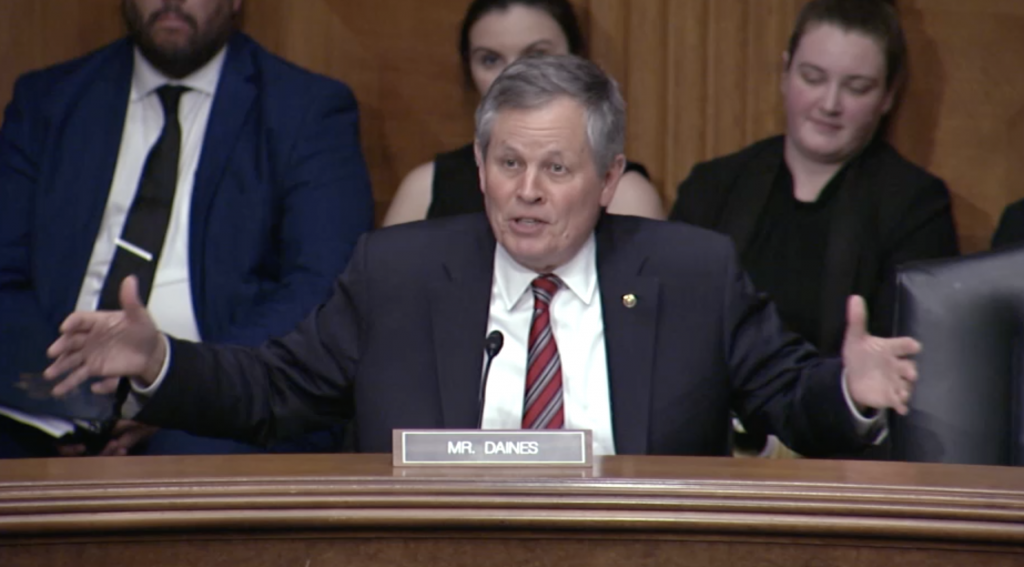WASHINGTON — U.S. Sen. Steve Daines pressed the nominee for Assistant Secretary of Indian Affairs on Thursday about the urgent need for expanded tribal law enforcement authority, emphasizing legislation that would give Montana’s tribal nations new tools to combat drug trafficking on reservation lands.
During a Senate Indian Affairs Committee hearing, Daines questioned William Kirkland about his support for the Protection for Reservation Occupants Against Trafficking and Evasive Communications Today (PROTECT) Act, bipartisan legislation Daines introduced in June to address jurisdictional gaps that drug traffickers have exploited on tribal lands.
“Mr. Kirkland, will you commit to working with me to enhance public safety in Indian Country and to help tribal law enforcement get the resources they so badly need?” Daines asked during the hearing.
The PROTECT Act would expand Special Tribal Criminal Jurisdiction to allow tribal courts to prosecute non-Native offenders for drug trafficking — authority they currently lack. The legislation would also authorize tribal courts to execute warrants for electronic evidence to better investigate drug crimes.
Daines’ questioning comes as Montana’s tribal communities continue to grapple with drug trafficking and violent crime. Recent federal prosecutions have highlighted the scope of the problem, including cases involving fentanyl and methamphetamine trafficking on the Flathead Reservation.
“The drug dealers are devastating our communities, and we need all the tools possible to stop this scourge,” Justin Gray Hawk Sr., chairman of the Assiniboine and Sioux Tribes at Fort Peck, said when the PROTECT Act was introduced.
During Thursday’s hearing, Daines emphasized the severity of the crisis facing Montana’s tribal communities, stating: “Public safety is the number one concern. I hear this from Indian country all the time and frankly on the ground it is beyond a full-blown crisis in Montana. Cartel members are exploiting jurisdictional loopholes and often operating with impunity on Montana’s reservations.”
The senator highlighted the resource challenges facing tribal law enforcement, explaining: “Tribal law enforcement are trying to police some areas that are larger than Rhode Island, with only a handful of officers and insufficient resources.”
Daines also provided stark statistics about the impact of the drug crisis in Indian Country: “Going back about 10 years, drug overdoses in Montana have skyrocketed, and deaths in Indian Country are three times higher than the rest of Montana.”
In addition to the PROTECT Act, Daines questioned Kirkland about the long-overdue Fort Belknap water settlement, which would resolve a century-old dispute over water rights affecting the Gros Ventre and Assiniboine tribes.
“Water settlements are a big deal. The Fort Belknap are the original Winters tribe. And their settlement has been over a century in the making,” Daines said. “After decades of negotiation and strong leadership from President Jeff Stiffarm, who’s been a great friend and ally and a courageous president, we’re almost across the finish line to settle a hundred-year issue.”
Daines emphasized the importance of resolving the dispute: “Without a settlement, farmers, ranchers, water users are left in limbo, and these issues are going to end up being litigated in court. This will help bring clean drinking water to the reservation and provide certainty for not only tribal users, but non-tribal water users alike.”
The senator noted that “this settlement has already passed the Senate twice, and has unanimous support from the tribe, the state of Montana, relevant counties, and the entire Montana delegation.”
“Mr. Kirkland, do you agree it is important to enact this agreement to settle a 100-year dispute to close at the last water settlement in Montana, and will you work with Congress to get this done?” Daines asked.
Kirkland responded: “I want work with Congress to make sure that we comply with all treaty obligations to honor our trust responsibly with tribes. Water is vital to life.”
The hearing addressed broader concerns about public safety in Indian Country, where jurisdictional complexities have historically hampered law enforcement efforts. Montana’s tribal communities have been particularly affected by the opioid crisis and related criminal activity.
Montana Attorney General Austin Knudsen has endorsed the PROTECT Act, warning that “leaving our tribal communities without the authority to hold non-Native traffickers accountable makes them a target for the cartels that are bringing deadly drugs, like fentanyl, across the southern border.”
The legislation has garnered support from tribal leaders across Montana, including Gene Small, president of the Northern Cheyenne Tribe, who called on Congress to “meet its responsibilities and pass this legislation so we can keep our people safe.”
“I’ve sat down with tribal leaders across Western Montana, and the devastation of the opioid crisis is both heartbreaking and unacceptable,” Rep. Ryan Zinke, R-Mont., said when the House companion bill was introduced. “The PROTECT Act gives Tribal Nations the tools and authority they need to take on the opioid crisis.”
